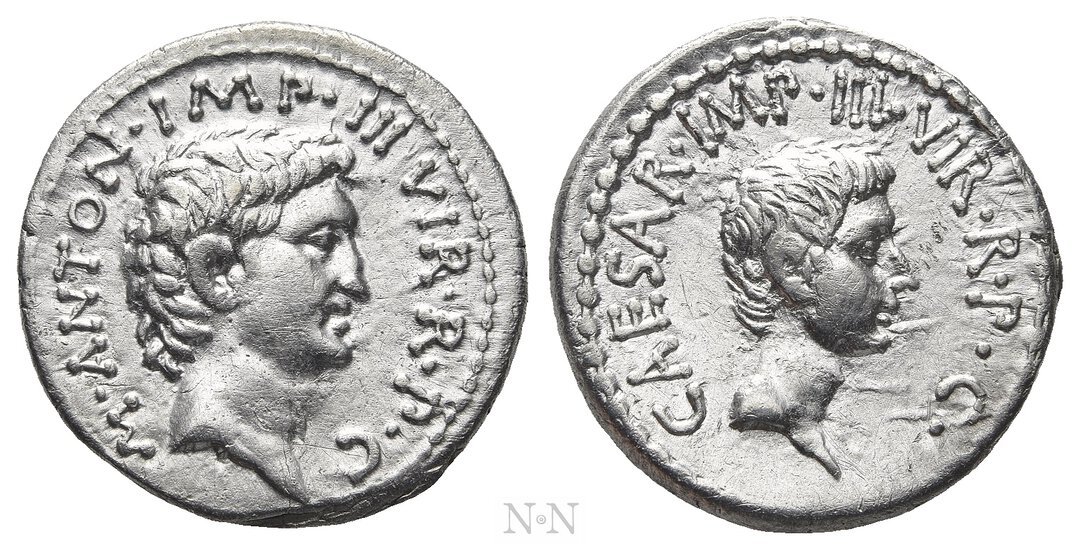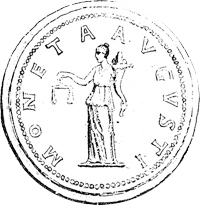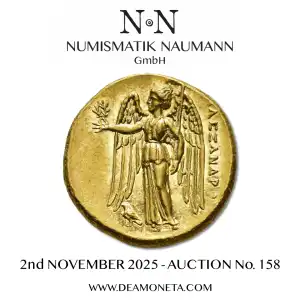Excellent Style




MARK ANTONY and OCTAVIAN. Denarius (39 BC). Military mint travelling with Mark Antony.
Obv: M ANTON IMP III VIR R P C.
Bare head of Mark Antony right.
Rev: CAESAR IMP III VIR R P C.
Bare head of Octavian right.
Crawford 528/2b; CRI 261a; RBW 1814.
Rare
Following the assassination of Julius Caesar (44 BC), the city celebrated the feat of the conspirators who had ended the dictator's life. Mark Antony, by reading the deceased's will and delivering an eloquent speech, managed to win to his side the Roman people, forcing the Caesaricides to leave Rome, but allowing Brutus to move to Mantua where he gained control of Gallia Comata. The political scene changed when Octavian, Caesar's great-nephew, came to power. Using his family name and wanting to get revenge for his dad, he got a lot of support in the Senate and pushed for tougher measures against Caesar's killers. Antony then moved against Brutus and started the siege of Modena, but he lost more and more support in the Senate, partly because of Cicero's Philippics, and was declared a “public enemy.” This led to a confrontation between the armies of Antony and Octavian at Modena, where the two consuls, Hirtius and Pansa, lost their lives. Octavian won the battle but eventually made peace with Antony. This agreement led to the creation of the Second Triumvirate (43 BC) together with the Magister Equitum, Marcus Lepidus. Unlike the First Triumvirate, the Second was a genuine political office lasting five years and approved by law. The triumvirs drew up a list of citizens believed to be Caesar's killers or their accomplices and brutally restored order in Rome, then turned their attention to Greece, where Sextus Pompey (son of Pompey the Great) had gathered an army. The Caesaricides were defeated at Philippi in 42 BC, and Brutus and Cassius killed themselves to avoid capture. Following these events, the triumvirs were finally able to divide up the empire: Octavian secured the West, Antony the East, and Lepidus Africa. This denarius was struck during that period of truce, bearing the portraits of both Antony and Octavian, before the events that led to the breakdown of this alliance and the Battle of Actium.
Condition: Extremely fine.
Weight: 3.52 g.
Diameter: 19 mm.
Obv: M ANTON IMP III VIR R P C.
Bare head of Mark Antony right.
Rev: CAESAR IMP III VIR R P C.
Bare head of Octavian right.
Crawford 528/2b; CRI 261a; RBW 1814.
Rare
Following the assassination of Julius Caesar (44 BC), the city celebrated the feat of the conspirators who had ended the dictator's life. Mark Antony, by reading the deceased's will and delivering an eloquent speech, managed to win to his side the Roman people, forcing the Caesaricides to leave Rome, but allowing Brutus to move to Mantua where he gained control of Gallia Comata. The political scene changed when Octavian, Caesar's great-nephew, came to power. Using his family name and wanting to get revenge for his dad, he got a lot of support in the Senate and pushed for tougher measures against Caesar's killers. Antony then moved against Brutus and started the siege of Modena, but he lost more and more support in the Senate, partly because of Cicero's Philippics, and was declared a “public enemy.” This led to a confrontation between the armies of Antony and Octavian at Modena, where the two consuls, Hirtius and Pansa, lost their lives. Octavian won the battle but eventually made peace with Antony. This agreement led to the creation of the Second Triumvirate (43 BC) together with the Magister Equitum, Marcus Lepidus. Unlike the First Triumvirate, the Second was a genuine political office lasting five years and approved by law. The triumvirs drew up a list of citizens believed to be Caesar's killers or their accomplices and brutally restored order in Rome, then turned their attention to Greece, where Sextus Pompey (son of Pompey the Great) had gathered an army. The Caesaricides were defeated at Philippi in 42 BC, and Brutus and Cassius killed themselves to avoid capture. Following these events, the triumvirs were finally able to divide up the empire: Octavian secured the West, Antony the East, and Lepidus Africa. This denarius was struck during that period of truce, bearing the portraits of both Antony and Octavian, before the events that led to the breakdown of this alliance and the Battle of Actium.
Condition: Extremely fine.
Weight: 3.52 g.
Diameter: 19 mm.


